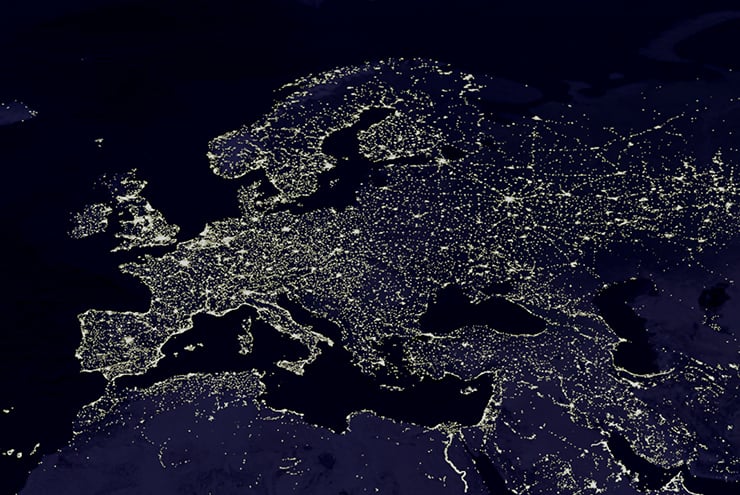Last week our readers were offered a rather gloomy assessment of the future of Europe from Hervé Juvin, a Member of European Parliament and a prominent French author, who spoke to me last month in Banja Luka.
On the other side of the Rhine, the patriotic right is facing an even more formidable struggle for legitimacy than in France. Its supporters are confronted with the blind hostility of a deeply dysfunctional political and media apparatus, a society in which de-Germanization has long been a fait accompli among the ruling elite.
Ulrich Singer, a prominent lawyer, a leader of the Alternative for Germany (Alternative für Deutschland, AfD), and a member, since 2018, of the Bavarian State Assembly, warns that the much-heralded renaissance of the European patriotic Right is by no means certain. He points out that the fifth most populous country of the European Union, once considered a veritable bastion of patriotic and family values, has succumbed to the enemy:
Poland’s new left-liberal government, which advocates mass immigration, pro-LGBTQ laws, liberalism on steroids, abortion, and destabilization of the traditional family by abolishing child benefits, is a reflection of the crisis Europe is facing. Mass immigration, the emergence of parallel and counter societies, polarization, violence, and an overall decline in values, threaten our Western culture and European soul.
The universalism imposed by the EU is gradually permeating all European nations, Singer says. Under the guise of freedom of speech, the greatest absurdities that go against the traditions of European culture—and, therefore, of European identity—are legitimized and celebrated:
The fruits of the Age of Enlightenment are increasingly taking on totalitarian forms. Against biological and scientific facts, the EU dictates what the truth should be. It is forbidding the designation of biological women as women, and biological men as men, if they feel different. For an entire month, national flags on public buildings are replaced by the rainbow flag of the LGBTQ movement. Germany’s Self-Determination Act, allowing children from the age of 14 to change their official gender and names once a year, is exemplary of the demoralization and de-scientification of our society.
The result, Singer concludes, is “the loss of our freedom and identity.”
South of the Alps, in Italy, the patriotic right is nominally in power—yet the scene is far from idyllic, according to Valerio Cignetti, Secretary-General of the Alliance of European National Movements. When asked where, when, and why the European project went bad—from “the Europe of Nations” of De Gaulle to the Monster of Brussels of today—he replied that the roots of the problem are in the Old Continent’s loss of economic and political sovereignty:
The construction of a healthy and constructive alliance of independent nations of Europe has foundered because, starting from the original nucleus after the Second World War, we have arrived at a commercial-banking union totally in the hands of non-European economic powers. The process, facilitated by the US/NATO military occupation, has led to the adoption of the single currency, the euro, which was not in fact “single,” and to the enforced enlargement of the EU without prior adjustment of the new members. All this happened without the EU producing a shared European constitutive charter—indeed imposing it from above and ignoring national referendums that rejected it.
Cignetti believes that the period between 1998 and 2007—which covers the adoption of the euro, the EU enlargement to the East, and the signing of the Treaty of Lisbon—marked the final failure of the Europe of Nations project. He allows the possibility of Europe’s recovery, the way out of the “political-economic-social funnel in which Europe has ended up,” if it follows the path of Euro-Asian cooperation:
A strong and cohesive Europe, obviously including all its specificities, firm in its principles and ready to cooperate on equal terms with the oil-producing Arab countries, with the Indian Subcontinent, with China and Asia in general, would be able to regain its leadership role and free itself from the domination of the United States and its satellites. Blocking any attempt in this direction by any means possible seems to be the priority of the bureaucrats in Brussels and NATO right now.
As for the possibility of changing the existing power structure within Europe by regular means, Cignetti is not optimistic:
It seems impossible to reverse the current situation: the European Parliament is in the hands of non-European lobbies which work exclusively for their interests. The same lobbies then influence the national elections and the formation of national governments, ensuring that they are controlled by the European Commission and the European Council. There have been many attempts to break away from this dominion, but all of them failed miserably because their leaders were harnessed or bought by the financial elites.
In many Western nations, Cignetti goes on, there is no longer any barrier to the destruction of one’s identity. Everything is allowed—everything linked to tradition, our religion, and to our indigenous thought, is considered inappropriate and incorrect; in some cases, these things have already become crimes to be prosecuted in the courts of justice.
In “an unconscious manner,” Cignetti concludes, national communities are disappearing in favor of the groupings of citizens, consumers of goods and lifestyles peddled by various lobbies, and dominated by politically correct thinking promoted by financial potentates:
In this situation, it is hard to imagine the survival of a European identity at the end of this century. We have reached a point of no return, at least in the western part of the continent. We are heading towards something akin to the fall of the Roman Empire, the end of an era, total upheaval, a period of instability, regression, and insecurity.

Leave a Reply